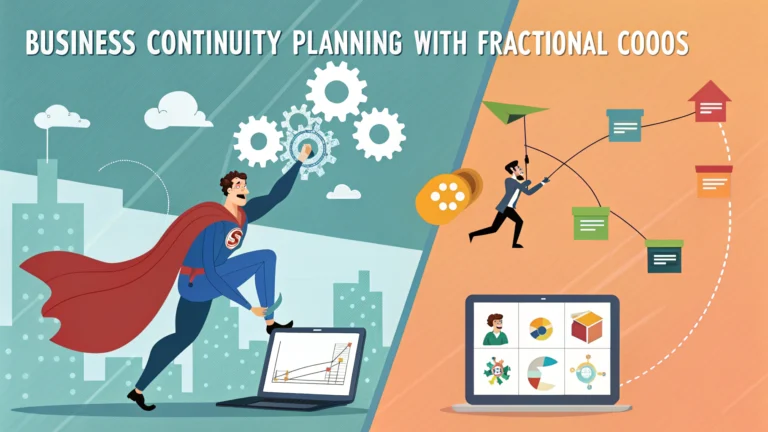Business continuity planning ensures your organization can maintain essential functions during and after disruptions, and working with a fractional COO can streamline this critical process.
A fractional COO brings specialized expertise in risk assessment, emergency response protocols, and recovery strategies without the cost of a full-time executive.
This guide explores how partnering with a fractional COO can help develop and implement an effective business continuity plan (BCP) that protects your operations, employees, and bottom line.
Key Components of Business Continuity Planning
- Risk Assessment and Business Impact Analysis
- Emergency Response Procedures
- Recovery Strategies
- Plan Testing and Maintenance
- Communication Protocols
How a Fractional COO Adds Value to BCP
A fractional COO brings objective outside perspective to identify blind spots in your current continuity planning.
They leverage experience from multiple organizations to implement best practices tailored to your specific needs.
Their expertise helps optimize resource allocation and prioritize critical business functions.
Step-by-Step BCP Development Process
- Initial Assessment
- Review existing procedures
- Identify critical business functions
- Document current resources
- Risk Analysis
- Evaluate potential threats
- Assess impact severity
- Determine likelihood of occurrence
- Strategy Development
- Create response procedures
- Establish recovery timelines
- Define roles and responsibilities
Implementation Best Practices
Regular testing and updates keep your BCP relevant and effective.
Employee training ensures everyone understands their roles during disruptions.
Documentation must be accessible and clear for quick reference during emergencies.
Technology and Tools
- Cloud-based backup systems – Microsoft Azure, AWS, Google Cloud
- Communication platforms – Slack, Microsoft Teams, Zoom
- Project management tools – Monday.com, Asana, Trello
Cost Considerations
| Service | Typical Cost Range |
|---|---|
| Fractional COO (Monthly) | $3,000 – $10,000 |
| BCP Software | $500 – $5,000/year |
| Employee Training | $200 – $1,000/person |
Next Steps for Success
Schedule a consultation with a fractional COO to assess your current business continuity readiness (typical consultation fees range from $250-500).
Set clear objectives and timelines for BCP development and implementation.
Allocate resources for necessary tools and training to support your continuity planning efforts.
Measuring BCP Effectiveness
Regular assessments and metrics help track the success of your business continuity planning efforts.
- Recovery Time Objectives (RTO)
- System uptime percentages
- Response time during drills
- Employee preparedness scores
Common Implementation Challenges
Resource Constraints
Budget limitations and staffing shortages can impact BCP effectiveness. A fractional COO helps optimize available resources and identify cost-effective solutions.
Employee Resistance
Change management strategies and clear communication help overcome resistance to new procedures and protocols.
Technical Complexities
Integration of various systems and tools requires careful planning and expertise to ensure seamless operation during disruptions.
Industry-Specific Considerations
- Healthcare – HIPAA compliance, patient care continuity
- Financial Services – Data security, regulatory requirements
- Manufacturing – Supply chain resilience, equipment redundancy
- Retail – Inventory management, customer service continuity
Securing Your Business Future
A robust business continuity plan is essential for long-term sustainability and growth. Working with a fractional COO provides the expertise needed to develop and maintain an effective BCP while managing costs.
Regular updates, testing, and refinement of your plan ensure your organization remains resilient in the face of unexpected challenges.
Invest in proper planning today to protect your business operations, employees, and stakeholders tomorrow.
FAQs
- What is a Fractional COO’s role in Business Continuity Planning?
A Fractional COO helps organizations develop, implement, and maintain business continuity plans while working on a part-time basis. They assess risks, create emergency response procedures, and ensure critical business functions can continue during disruptions. - How does a Fractional COO develop an effective Business Continuity Plan?
They conduct business impact analysis, identify critical processes, establish recovery time objectives, create emergency response procedures, and develop communication protocols while working with key stakeholders across the organization. - What are the key components of a Business Continuity Plan that Fractional COOs focus on?
Key components include risk assessment, emergency response procedures, crisis communication plans, IT disaster recovery, critical business function identification, and recovery strategies for various scenarios. - How often should a Business Continuity Plan be updated with a Fractional COO?
Business Continuity Plans should be reviewed and updated at least annually, or whenever significant changes occur in business operations, technology, or organizational structure. - What cost advantages does hiring a Fractional COO bring to Business Continuity Planning?
Organizations save on full-time executive salary while gaining expertise in business continuity planning. Fractional COOs provide high-level strategic planning at a fraction of the cost of a full-time COO. - How do Fractional COOs ensure employee training for Business Continuity Plans?
They develop training programs, conduct regular drills and exercises, maintain documentation, and ensure all key personnel understand their roles and responsibilities during business disruptions. - What industries commonly use Fractional COOs for Business Continuity Planning?
Small to medium-sized businesses, startups, manufacturing companies, technology firms, and service-based organizations frequently utilize Fractional COOs for business continuity planning. - How do Fractional COOs handle testing and validation of Business Continuity Plans?
They schedule regular testing exercises, simulate various disruption scenarios, document results, identify gaps, and implement improvements based on test outcomes and lessons learned. - What metrics do Fractional COOs use to measure Business Continuity Plan effectiveness?
Key metrics include recovery time objectives (RTO), recovery point objectives (RPO), test results, incident response times, and the number of successfully resolved disruptions. - How do Fractional COOs integrate Business Continuity Planning with overall business strategy?
They align continuity planning with business objectives, ensure resource allocation matches risk priorities, and incorporate continuity considerations into strategic decision-making processes.







